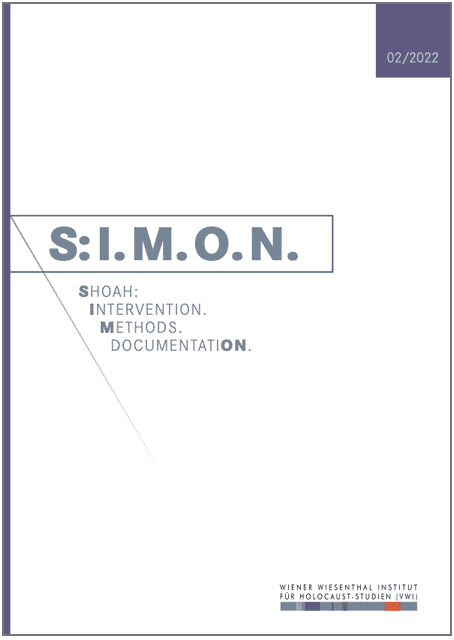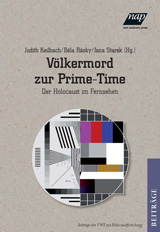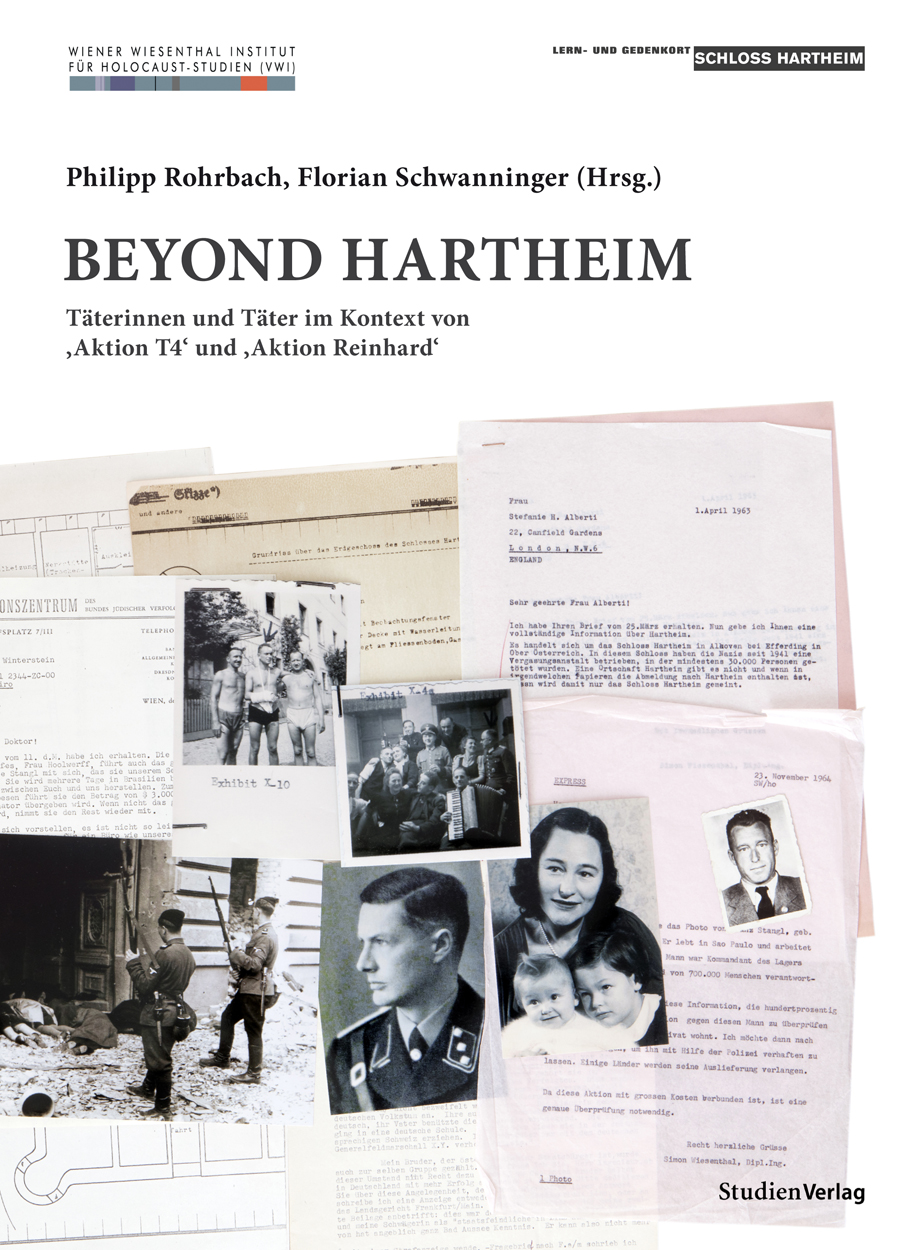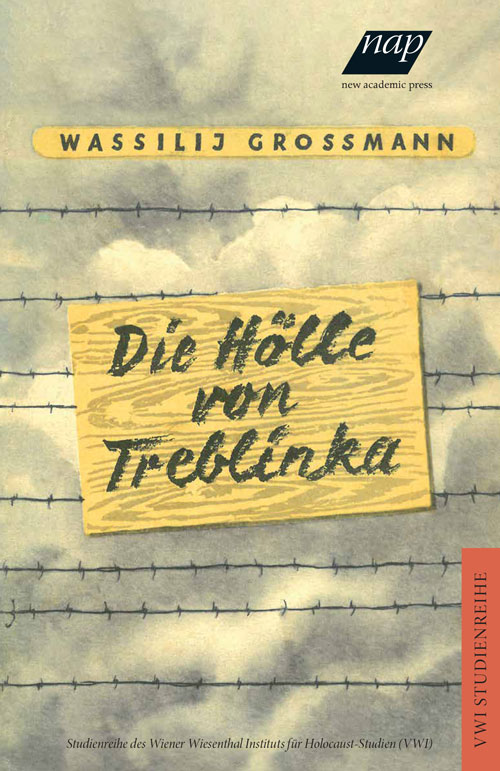News – Events – Calls
| 24. April 2024 19:00 BuchpräsentationIngeborg Bachmann, Marie Luise Kaschnitz, Hilde Domin, Nelly Sachs: Über Grenzen sprechend. Briefe. Piper/Suhrkamp, München, Berlin, Zürich 2023Ingeborg Bachmann stand mit zentralen Protagonistinnen der deutschsprachigen Literatur im Austausch, nun werden ihre Briefwechsel mit Marie Luise Kaschnitz, Hilde Domin und Nelly Sachs erstmals zugänglich gemacht. Die Briefe geben Einblick in die Lebensbedingungen, das literarische S...Weiterlesen... |
| 02. May 2024 18:30 Simon Wiesenthal LectureEdyta Gawron: Never Too Late to Remember, Never Too Late for Justice! Holocaust Research and Commemoration in Contemporary PolandIn 1994, Simon Wiesenthal received a doctorate honoris causa from the Jagiellonian University in Krakow for his lifelong quest for justice – half a century after he had been, for a short time, prisoner of the local Nazi Concentration Camp (KL) Plaszow. The 1990s were the decade when t...Weiterlesen... |
| 07. May 2024 00:00 - 04. June 2024 00:00 WorkshopDealing with Antisemitism in the Past and Present. Scientific Organisations and the State of Research in AustriaThis series of talks, presented by antisemitism experts from different organisations that research antisemitism using a variety of academic approaches, aims to provide a snapshot of historical evolutions, current events, prevalent perceptions and declared (and undeclared) attitudes. I...Weiterlesen... |
| 14. May 2024 08:45 - 16. May 2024 16:30 TagungQuantifying the Holocaust. Classifying, Counting, Modeling: What Contribution to Holocaust History? About the conference: https://quantiholocaust.sciencesconf.org/ Programme timed on the basis of 15-minute presentations + 15-minute discussions; short breaks and lunches Day 1 Tuesday, 14 May 2024Centre Malher (9 rue Malher 75004 Paris/amphi Dupuis) From 8.45 am: Welcome9.30 am...Weiterlesen... |
| 24. May 2024 18:00 InterventionLange Nacht der Forschung 20242024 öffnet das Wiener Wiesenthal Institut für Holocaust-Studien (VWI) in der Langen Nacht der Forschung wieder seine Tore und lädt Interessierte in seine Räumlichkeiten am Rabensteig 3 ein. Im Rahmen von Vorträgen, Podiumsdiskussionen und Präsentationen bieten VWI-Team und Gäste Einb...Weiterlesen... |
Justyna Majewska
Junior Fellow (11/2018–05/2019)
Visions of the Social Changes in the Warsaw Ghetto between 1940 and 1942
 Analysing social changes that emerged in the Jewish community when trapped in the Warsaw Ghetto, my doctoral dissertation explores these shifts through the lenses of Jews, Nazi Germans, and Poles.
Analysing social changes that emerged in the Jewish community when trapped in the Warsaw Ghetto, my doctoral dissertation explores these shifts through the lenses of Jews, Nazi Germans, and Poles.
Drawing on social studies theories, I examine the Warsaw Ghetto as an area of various, rapid, and traumatic social changes. Originating in terror, plunder, and separation, these led to the pauperisation and degradation of social structures. My analysis is fixed between 1940 and 1942, when the isolated Jewish community was most susceptible to changes in social structure. Nevertheless, I show that various social and political processes had their origins in the 1930s and beyond.
First, I analyse the process behind the establishment of the Warsaw Ghetto. Starting from the Nazi understanding of the term ghetto before the war, I scrutinise the process of establishing the Warsaw Ghetto in comparison to other ghettos in occupied Poland and in the context of the “Nisko” and “Madagaskar” resettlement plans.
Fears and predictions regarding life in the ghetto were core elements of the Jewish perspective. Responses to the imposed reality were rooted in personal experiences as well as the history of the persecution of Jews across Europe. Although the Nazis saw the Jewish community in the ghetto as homogeneous, it was a complex group. In the imposed ghetto reality, various political circles remained active. Zionists, Socialists, and Bundists, acculturated and religious Jews pondered not only how to survive the present but also their future. Intense debates focussed on the expected social structure of Jewry, the language Jews would speak, education, and the professions the post-war generation would pursue.
Finally, my dissertation addresses the issue of the Polish perspective on the ghetto phenomenon. Starting from Polish ideas of dealing with national minorities proposed by Polish right-wing politicians and intellectuals in 1930s, I aim to examine the extent to which Poles, especially the intelligentsia, were able to change their pre-war negative attitude towards Jews.
In the dissertation, I will use documents from the Underground Archive of the Warsaw Ghetto (Ringelblum Archive) as well as other wartime and post-war documents from the Jewish Historical Institute at Yad Vashem and the USHMM. I will also use documents of German authorities and draw from the Polish press and diaries of intelligentsia.
Justyna Majewska is a PhD candidate at the Graduate School for Social Research at the Institute of Philosophy and Sociology of the Polish Academy of Sciences, Warsaw. She works in the Research Department of the Jewish Historical Institute in Warsaw. She is also a member of the editorial board of the Polish scholarly journal Zagłada Żydów. Studia i materiały (Holocaust Studies and Materials).
She received her MA in Cultural Studies from the Maria Curie-Sklodowska University in Lublin and completed a postgraduate certificate course in Exhibiting Contemporary History at the Friedrich Schiller University of Jena. She was an EHRI fellow at the Yad Vashem Institute. She is an editor of the Kalisz letters published by the Jewish Historical Institute in a series of scholarly editions of documents from the Ringelblum Archive. She has published in Zagłada Żydów. Studia i materiały and East European Jewish Affairs.
Maayan Armelin
Junior Fellow (10/2020 – 3/2021)
Leadership Styles and Social Relations in the SS-Einsatzgruppen
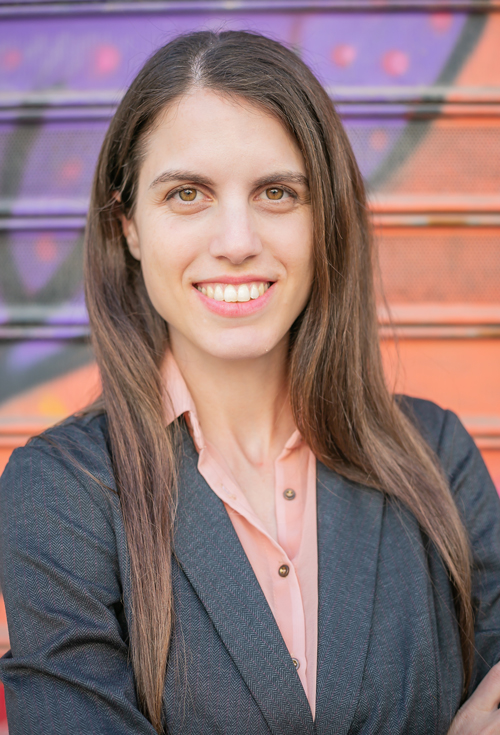 This doctoral dissertation studies the SS-Einsatzgruppen, mobile squads who murdered over a million and a half Jewish and non-Jewish civilians in the Nazi-occupied Soviet Union. The project explores officers’ leadership styles and particular social relations within the units and how these affected members’ apparent willingness to perpetrate mass murder. The research draws on historical literature discussing cohesion and comradeship in military and paramilitary units during the Second World War and traces the operating structures, cultures, and social relations of various institutions under the Nazi regime. Combining social psychological concepts such as social identity theory, inter-group relations, leadership, and conformity, the project analyses testimonies of former Einsatzgruppen members given in postwar Germany and Austria. It explains how crucial patterns of leadership and peer relations encouraged individual Einsatzgruppen members to engage in mass violence.
This doctoral dissertation studies the SS-Einsatzgruppen, mobile squads who murdered over a million and a half Jewish and non-Jewish civilians in the Nazi-occupied Soviet Union. The project explores officers’ leadership styles and particular social relations within the units and how these affected members’ apparent willingness to perpetrate mass murder. The research draws on historical literature discussing cohesion and comradeship in military and paramilitary units during the Second World War and traces the operating structures, cultures, and social relations of various institutions under the Nazi regime. Combining social psychological concepts such as social identity theory, inter-group relations, leadership, and conformity, the project analyses testimonies of former Einsatzgruppen members given in postwar Germany and Austria. It explains how crucial patterns of leadership and peer relations encouraged individual Einsatzgruppen members to engage in mass violence.
Maayan Armelin is a PhD candidate at the Strassler Center for Holocaust and Genocide Studies at Clark University. She holds a BA in History and Psychology and an MA in Social Psychology from the University of Haifa. She has received fellowships from the Claims Conference (2014–2019) and EHRI (2017–2018) and previously worked at the Strochlitz Institute for Holocaust Research at the University of Haifa and on the editorial board of the Journal of Holocaust Research.
E-Mail: This email address is being protected from spambots. You need JavaScript enabled to view it.
Lukas Meissel
Junior Fellow (10/2020 – 8/2021)
The Perpetrator‘s Gaze. SS Photographs Taken at Concentration Camps
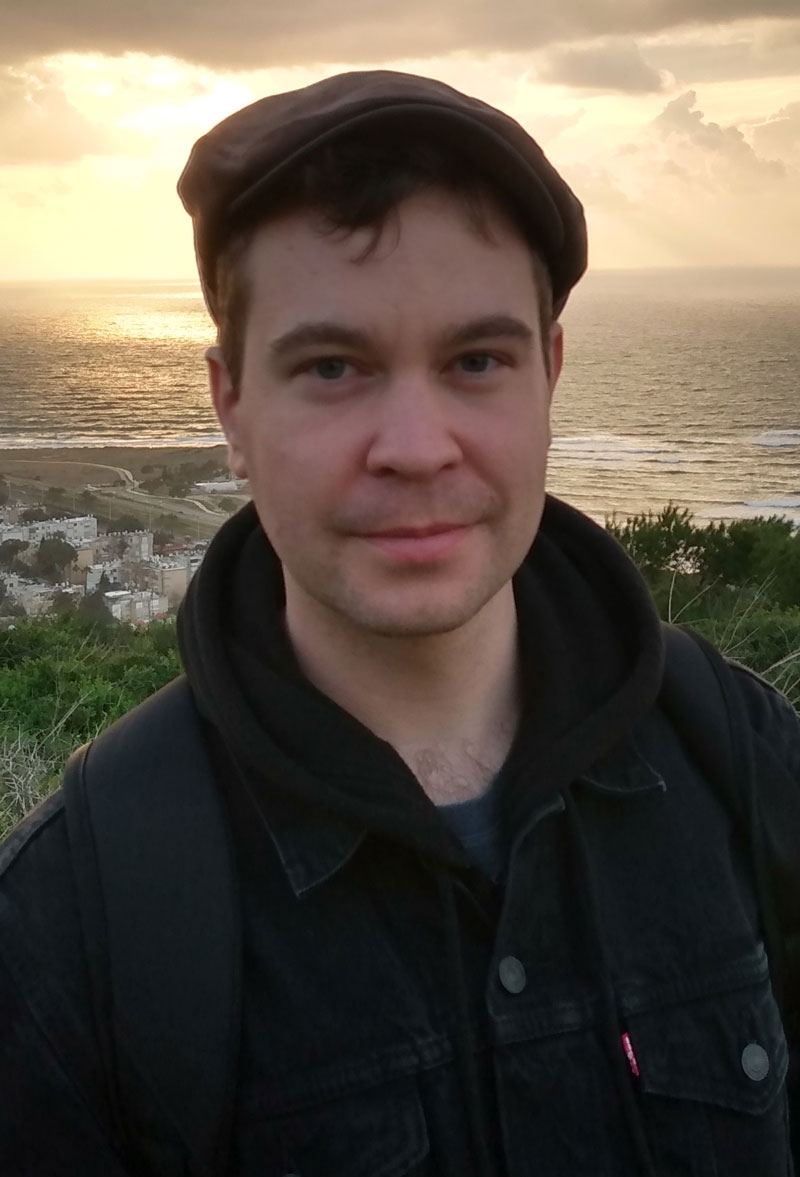 This PhD project focusses on perpetrator photography in Nazi concentration camps, specifically photographs taken by SS men and developed at Erkennungsdienste (identification departments). The images produced there include portraits of deportees, photos of prisoners conducting forced labour, construction sites and buildings in the camps, corpses of murdered inmates, events such as ceremonies or visits by delegations and Nazi officials, as well as private photographs of SS personnel. The aim of the project is to investigate not only what these pictures show, but to interpret them as visual perpetrator narratives of the concentration camps. The photographs highlight how the camps were supposed to work according to the SS, therefore they represent an idealised reality that never actually existed. A central argument of the project is that the photos played a decisive role in legitimising the camps within the SS and at certain points beyond the inner circle of perpetrators.
This PhD project focusses on perpetrator photography in Nazi concentration camps, specifically photographs taken by SS men and developed at Erkennungsdienste (identification departments). The images produced there include portraits of deportees, photos of prisoners conducting forced labour, construction sites and buildings in the camps, corpses of murdered inmates, events such as ceremonies or visits by delegations and Nazi officials, as well as private photographs of SS personnel. The aim of the project is to investigate not only what these pictures show, but to interpret them as visual perpetrator narratives of the concentration camps. The photographs highlight how the camps were supposed to work according to the SS, therefore they represent an idealised reality that never actually existed. A central argument of the project is that the photos played a decisive role in legitimising the camps within the SS and at certain points beyond the inner circle of perpetrators.
Lukas Meissel is a PhD candidate at the University of Haifa. His doctoral project analyses photos taken by SS men at concentration camps. Prior to his studies in Israel, he worked as a historian for the Jewish community of Vienna and as deputy chairperson of the Verein Gedenkdienst. He also worked on projects on behalf of Yad Vashem and guided numerous study trips. Meissel has held fellowships in Israel, the USA, Germany, and Austria and has published on visual history, Holocaust studies/education, and antisemitism.
E-Mail: This email address is being protected from spambots. You need JavaScript enabled to view it.
Connor Sebestyen
Junior Fellow (11/2020 – 5/2021)
German War Criminals 1945–1958. Their Oversight by the Allies, their Prisons, their Lives as Prisoners, and German Society
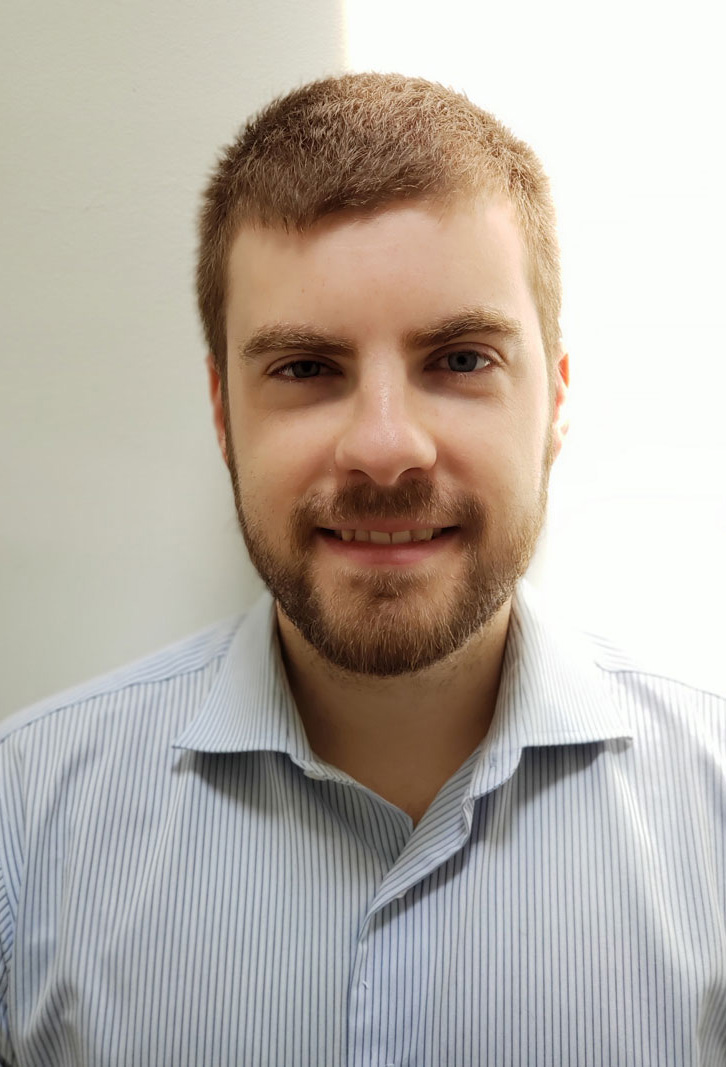 This dissertation uses a comparative approach to examine the imprisonment of German war criminals – many of whom were perpetrators of mass murder and genocide – by the Western Allies after the Second World War. There has been and is a great deal of scholarly attention paid to Allied war crimes trials, but there is to date little understanding of how the resulting sentences were carried out. If historians wish to understand postwar justice, how it was meted out, and how it was received by the German public, it is as important to understand the nature of the war criminals’ incarceration as it is to understand their sentencing and trials. This project examines how Western Allied prisons were administered and what role they played within the wider occupation. Drawing on archival material from the USA, UK, France, and Germany, my research shows how middle and low-level officials in the Allied military occupation governments paired with bottom-up grassroots pressure from broad sections of the German public to significantly influence the treatment of war criminals, the public understanding of their roles as perpetrators, and the implementation of mass amnesty.
This dissertation uses a comparative approach to examine the imprisonment of German war criminals – many of whom were perpetrators of mass murder and genocide – by the Western Allies after the Second World War. There has been and is a great deal of scholarly attention paid to Allied war crimes trials, but there is to date little understanding of how the resulting sentences were carried out. If historians wish to understand postwar justice, how it was meted out, and how it was received by the German public, it is as important to understand the nature of the war criminals’ incarceration as it is to understand their sentencing and trials. This project examines how Western Allied prisons were administered and what role they played within the wider occupation. Drawing on archival material from the USA, UK, France, and Germany, my research shows how middle and low-level officials in the Allied military occupation governments paired with bottom-up grassroots pressure from broad sections of the German public to significantly influence the treatment of war criminals, the public understanding of their roles as perpetrators, and the implementation of mass amnesty.
Connor Sebestyen is a doctoral candidate in History and Jewish Studies at the University of Toronto. His research interests lie at the intersection of military history, international relations, and the postwar social and judicial reckoning with the Holocaust. He has received fellowships from organisations such as Massey College, the Holocaust Education Foundation, and the Ontario, Canadian, and German governments. He has completed degrees at Trent University, Queen’s University, and the University of Oxford.
E-Mail: This email address is being protected from spambots. You need JavaScript enabled to view it.
Judith Vöcker
Junior Fellow (10/2020 - 8/2021)
“In the Name of the German Nation.”
The German Jurisdiction in Warsaw and Cracow during the Nazi Occupation
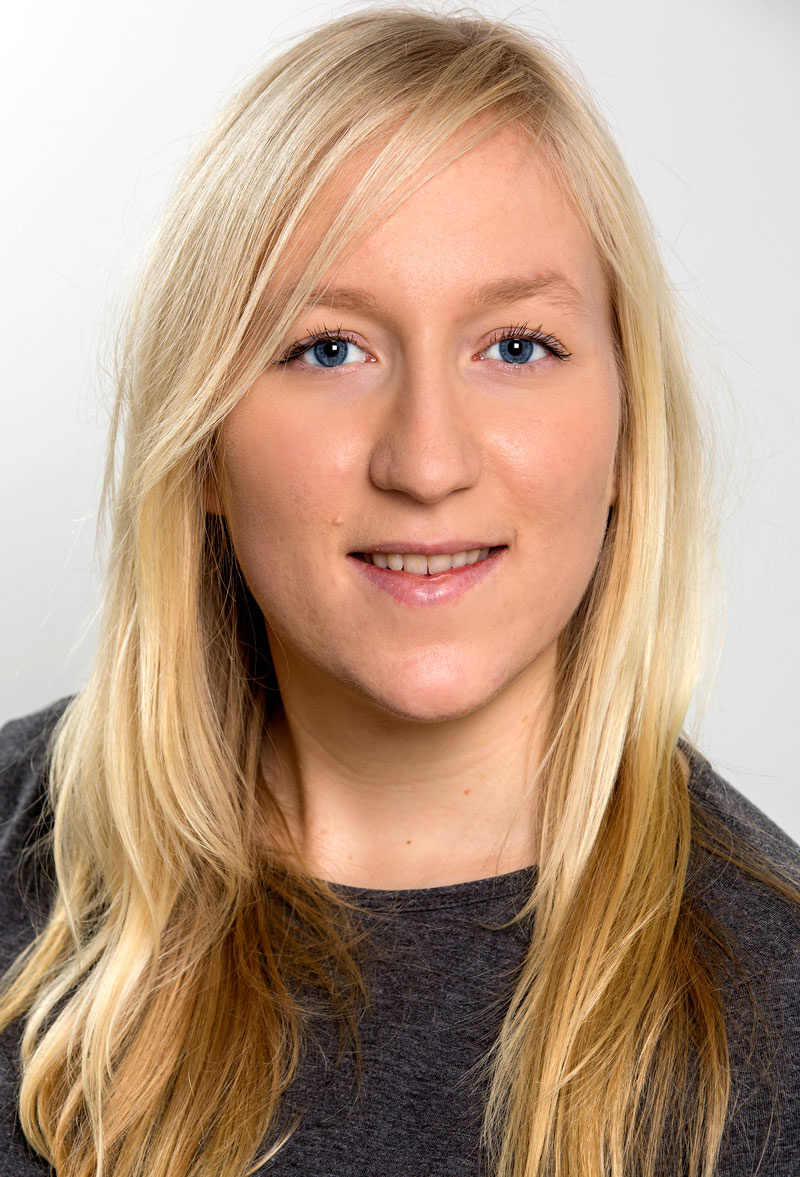 This PhD project focusses on the German jurisdiction in the General Government and how it treated and punished crimes committed by Jews, Poles, and ethnic Germans. It addresses what the occupiers defined as a criminal offense and according to which legal basis these crimes were prosecuted. This project focusses on the German Court and the Special Court and their verdicts, since they sentenced not only Jewish but also Polish and ethnic German defendants.
This PhD project focusses on the German jurisdiction in the General Government and how it treated and punished crimes committed by Jews, Poles, and ethnic Germans. It addresses what the occupiers defined as a criminal offense and according to which legal basis these crimes were prosecuted. This project focusses on the German Court and the Special Court and their verdicts, since they sentenced not only Jewish but also Polish and ethnic German defendants.
It examines the development of court verdicts over the years of Nazi occupation in Warsaw and Cracow. Thereby, it can show whether and why changes within these juridical entities occurred – or whether they were connected to the occupation policies regarding the respective territories or the successful/unsuccessful course of the war from the German perspective. To this end, I will discuss the occupation politics of the General Government to reveal which political and strategic purpose it was designed to serve. This is supported by a comparison of similar criminal offences committed by Jews, Poles, and ethnic Germans throughout the Nazi occupation. The focus lies on reconstructing the way in which German juridical entities treated criminal cases and offenders from all spheres of society and on exploring the extent to which their verdicts were influenced by their occupational aims, racial ideologies, and the course of the war.
Judith Vöcker is a doctoral candidate at the Stanley Burton Centre for Holocaust and Genocide Studies at the University of Leicester. She has held fellowships at the Midlands4Cities Doctoral Training Programme of the AHRC and the European Holocaust Research Infrastructure and has been the recipient of several grants and awards, including from the German History Society, the Institute of Contemporary History in Munich, and the Ludwig Maximilian University of Munich. Prior to starting her PhD, she studied Slavic Studies and German Literature and Linguistics in Cologne, Moscow, and Cracow and Eastern European History in Frankfurt/Oder and London.
E-Mail: This email address is being protected from spambots. You need JavaScript enabled to view it.
Timo Aava
Junior Fellow (10/2021-08/2022)
Jewish Cultural Autonomy in Interwar Estonia and the Life Trajectories of Jewish Autonomy Activists After Its Dissolution
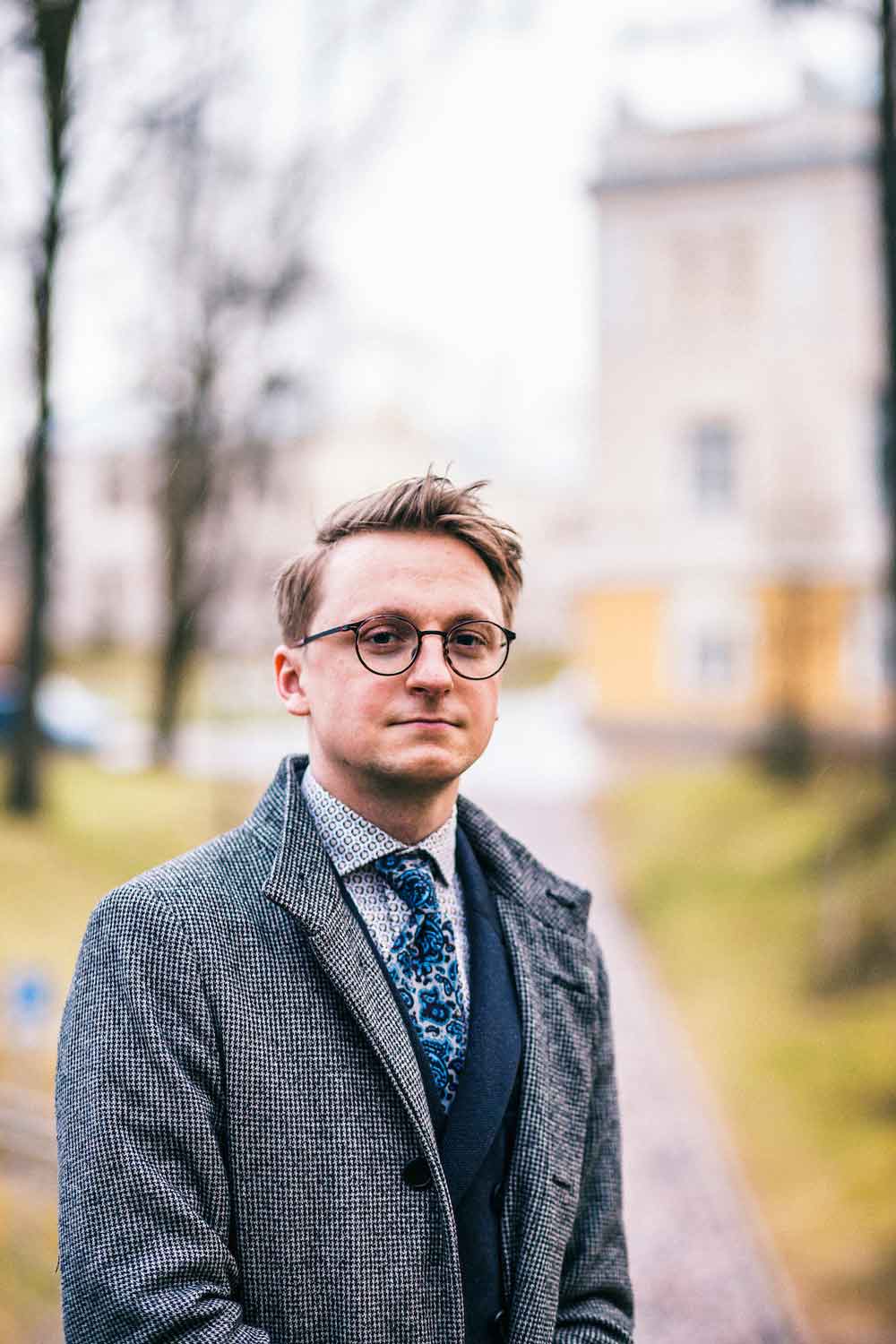 The principal aim of the project is to study Jewish cultural autonomy in interwar Estonia. The Law on Cultural Autonomy for National Minorities (1925) enabled ethnic minorities to establish their own self-governments to independently administer and fund through taxation their cultural and educational affairs. Two minority groups, Germans and Jews, established their self-governments. I aim to trace how Jewish autonomy was established and how it functioned. Furthermore, the aim is to analyse to which extent the Estonian Jewish community participated in broader debates over Jewish autonomy in late Tsarist and Revolutionary Russia. Furthermore, I will focus on some leaders of autonomy, and trace the trajectories that they experienced in these tumultuous years.
The principal aim of the project is to study Jewish cultural autonomy in interwar Estonia. The Law on Cultural Autonomy for National Minorities (1925) enabled ethnic minorities to establish their own self-governments to independently administer and fund through taxation their cultural and educational affairs. Two minority groups, Germans and Jews, established their self-governments. I aim to trace how Jewish autonomy was established and how it functioned. Furthermore, the aim is to analyse to which extent the Estonian Jewish community participated in broader debates over Jewish autonomy in late Tsarist and Revolutionary Russia. Furthermore, I will focus on some leaders of autonomy, and trace the trajectories that they experienced in these tumultuous years.
Timo Aava is a PhD student and a member of the ERC-funded project NTAutonomy in the East European History Department at the University of Vienna. He has also worked as a researcher at the Institute for Modern and Contemporary Historical Research at the Austrian Academy of Sciences. He has studied history at the University of Tartu and obtained his MA in 2015. His main interests are the history of political thought with a focus on the end of 19th century and first half of 20th century, Baltic and Estonian history, Marxism, nationalism, non-territorial autonomy.
E-Mail: This email address is being protected from spambots. You need JavaScript enabled to view it.
Philipp Dinkelaker
Junior Fellow (10/2021-06/2022)
‘Jewish Collaboration’? – Honor Court, Criminal Court and Compensation Trials Against Shoah Survivors in post-National Socialist Germany
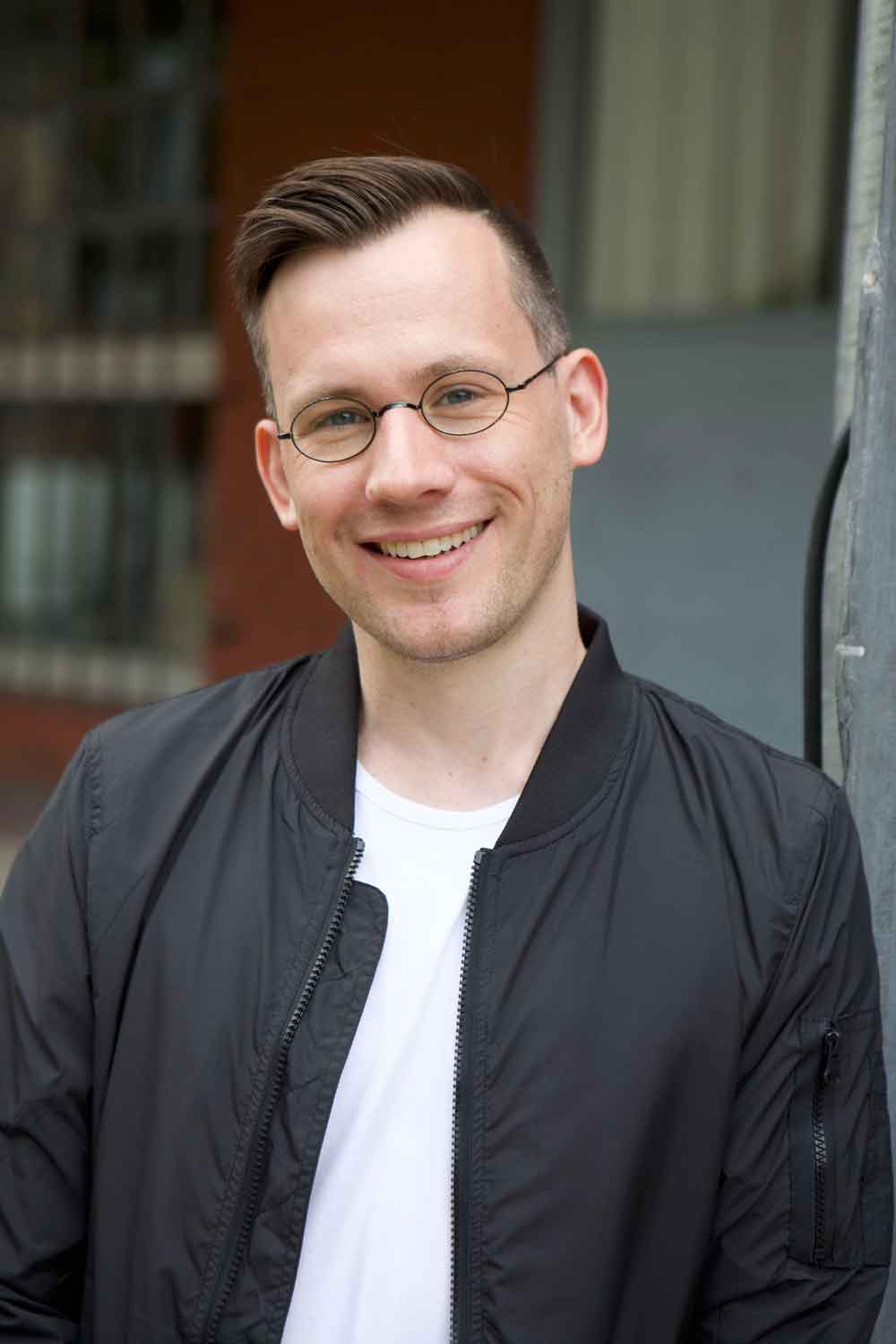 My PhD project deals with moral-ethical accusations and criminal proceedings against German-Jewish survivors of the Shoah, who were perceived as Nazi -collaborators ̨ in Cold War Germany. I analyze how German-Jewish survivors and the two German postwar societies treated Jews, who had been forced by the Nazis to hurt other Jews and embed this analysis into the wider picture of German Vergangenheitsbewältigung. With a new combination of sources, I show that accused survivors were not only brought to inner-Jewish honor courts. A considerable number of alleged Jewish Gestapo helpers was held accountable by German or Soviet law enforcement after the war, while the actual Gestapo perpetrators mostly got away.
My PhD project deals with moral-ethical accusations and criminal proceedings against German-Jewish survivors of the Shoah, who were perceived as Nazi -collaborators ̨ in Cold War Germany. I analyze how German-Jewish survivors and the two German postwar societies treated Jews, who had been forced by the Nazis to hurt other Jews and embed this analysis into the wider picture of German Vergangenheitsbewältigung. With a new combination of sources, I show that accused survivors were not only brought to inner-Jewish honor courts. A considerable number of alleged Jewish Gestapo helpers was held accountable by German or Soviet law enforcement after the war, while the actual Gestapo perpetrators mostly got away.
Philipp Dinkelaker is a historian from Berlin, who recently published a monograph about the Sammellager Synagoge Levetzowstraße (a detention camp for Jews) in Nazi-Berlin. He is a PhD candidate at the Centre for Research on Antisemitism at the Technical University of Berlin and has been a Junior Fellow at the Center for Holocaust-Studies at the Institute for Contemporary History in Munich.
E-Mail: This email address is being protected from spambots. You need JavaScript enabled to view it.
Lida-Maria Dodou
Junior Fellow (10/2021-08/2022)
Paths to Safety. Wars, Antisemitism and 500 Salonican Jews in their Quest for a Safe Haven, 1910-1938
 This project examines the influence antisemitism had on a group of Salonican Jews, who acquired the Austrian citizenship between 1910 and 1938. This group consisted of members of the Salonican Jewish economic and political elite and their actions affected the way the whole community functioned. The aim is to identify the role of antisemitism in their decision to acquire another citizenship and in choosing the Austrian one to this end. It also seeks to reconstruct their mobilities across Europe during the interwar period. The project employs a transnational and transimperial perspective as well as the methodology of social network analysis.
This project examines the influence antisemitism had on a group of Salonican Jews, who acquired the Austrian citizenship between 1910 and 1938. This group consisted of members of the Salonican Jewish economic and political elite and their actions affected the way the whole community functioned. The aim is to identify the role of antisemitism in their decision to acquire another citizenship and in choosing the Austrian one to this end. It also seeks to reconstruct their mobilities across Europe during the interwar period. The project employs a transnational and transimperial perspective as well as the methodology of social network analysis.
Lida-Maria Dodou is a PhD candidate at the University of Vienna. Her research project concerns the Salonican Jews, who settled in the Habsburg Empire and is incorporated in the research cluster State, Politics and Governance in Historical Perspective. She holds a MA in Political Sciences and History from Panteion University in Athens, and was granted a fellowship from the Provincial Government of Styria, Austria, for her MA-thesis Economy, Society, Politics and the Relations between Greeks and Jews in Salonika, 1908-1913.
E-Mail: This email address is being protected from spambots. You need JavaScript enabled to view it.
Jonathan Kaplan
Junior Fellow (10/2018–06/2019)
The Ministry of Foreign Affairs of the German Democratic Republic and the National Socialist Past
 This project deals with different perspectives on the post-war confrontation with the National Socialist past in the East German Ministry of Foreign Affairs. First, I analyse biographies of former members of the National Socialist Party and of other Nazi organisations who after 1945 developed a diplomatic career in the GDR. I then turn to the story of East German Jewish diplomats and politicians and portray their significant role in designing GDR foreign policy. The political attitude of these Jewish diplomats towards Israel, Zionism, and the Jewish world had a central place in their diplomatic activities. An example of confronting historical issues in actual foreign policies will be given by concentrating on the GDR’s international campaigns against former Nazi criminals in the Federal Republic. These efforts were followed by publishing incriminating material on former Nazis and by reaching out to and co-operating with international Jewish organisations. The confrontation of “the first Socialist state of workers and farmers on German soil” with its own past, despite its initial denial of this past, paints a fascinating picture of post-war German society that affects Germany to this very day.
This project deals with different perspectives on the post-war confrontation with the National Socialist past in the East German Ministry of Foreign Affairs. First, I analyse biographies of former members of the National Socialist Party and of other Nazi organisations who after 1945 developed a diplomatic career in the GDR. I then turn to the story of East German Jewish diplomats and politicians and portray their significant role in designing GDR foreign policy. The political attitude of these Jewish diplomats towards Israel, Zionism, and the Jewish world had a central place in their diplomatic activities. An example of confronting historical issues in actual foreign policies will be given by concentrating on the GDR’s international campaigns against former Nazi criminals in the Federal Republic. These efforts were followed by publishing incriminating material on former Nazis and by reaching out to and co-operating with international Jewish organisations. The confrontation of “the first Socialist state of workers and farmers on German soil” with its own past, despite its initial denial of this past, paints a fascinating picture of post-war German society that affects Germany to this very day.
Jonathan Kaplan is a PhD candidate in History at the Free University of Berlin. He holds a BA in Political Science and History and an MA in History from the Hebrew University of Jerusalem. His MA thesis was entitled ‘The German Question’ in the East-German Historiography, 1945–1961. Culture, Territory and Enemies. From 2009 to 2012, he was a fellow at the Richard Koebner Minerva Center for German History.
Benedetta Carnaghi
Junior Fellow (09/2018–02/2019)
Feeding the Concentrationary Universe. How Nazi Spies Contributed to Deportation in the Second World War
 Benedetta Carnaghi’s dissertation compares the activity of spies in the Italian Fascist secret police, called OVRA (Organizzazione per la Vigilanza e la Repressione dell'Antifascismo), and its Nazi counterpart, the Gestapo (Geheime Staatspolizei), from 1927 (the genesis of the OVRA) to 1945.
Benedetta Carnaghi’s dissertation compares the activity of spies in the Italian Fascist secret police, called OVRA (Organizzazione per la Vigilanza e la Repressione dell'Antifascismo), and its Nazi counterpart, the Gestapo (Geheime Staatspolizei), from 1927 (the genesis of the OVRA) to 1945.
Her plan is to shift the focus from institutional stories of the police to a detailed analysis of the police informers’ profiles and motives, while using history as a tool for actively engaging in current debates about surveillance. The specific goal of her stay at the VWI is to lay the groundwork for a chapter of her dissertation that will investigate the connection between spying and deportation.
She aims to look at the scale and chain of command of the Nazi terror system from the bottom up: The last wheels of this system were spies, who pretended to be allies of the antifascist resistance members, but constantly worked to feed their names to the Nazi regime. Who were these spies? What motivated them to orchestrate the arrest and deportation of resistance members, Allied soldiers, and Jews?
Benedetta Carnaghi is a PhD candidate in History at Cornell University. She has been the recipient of numerous fellowships, most recently from the Judith Reppy Institute for Peace and Conflict Studies, the Chateaubriand Fellowship Program, the Lemmermann Foundation, and Trinity College’s Cesare Barbieri Endowment.
Her most recent article Three Layers of Ambiguity. Homosexual Spies and International Intrigue in Fascist Italy was published in the 2017 special issue of The Space Between. Literature and Culture 1914–1945.
Kathryn L. Brackney
Junior Fellow (10/2018–06/2019)
Phantom Geographies: An Alternative History of Holocaust Consciousness
 My dissertation poses two major questions: Why have realism, fragmentation, and minimalism become the primary aesthetic conventions of Holocaust memory in Western Europe, North America and Israel? Before these conventions predominated, how did writers and artists describe the destruction of Europe’s Jewish communities? The sources in this project speak to the wide range of imaginative strategies used by figures such as Avrom Sutzkever, Anna Langfus and Claude Lanzmann to work through the past, and reveal an interplay between an under-studied surreal tradition of representation and more canonical modes of remembering the Holocaust. With a particular focus on spatial configurations of memory, I show how portrayals of victims and survivors have moved over time from an otherworldly “Planet Auschwitz” to the intimate domestic spaces of documentary testimony.
My dissertation poses two major questions: Why have realism, fragmentation, and minimalism become the primary aesthetic conventions of Holocaust memory in Western Europe, North America and Israel? Before these conventions predominated, how did writers and artists describe the destruction of Europe’s Jewish communities? The sources in this project speak to the wide range of imaginative strategies used by figures such as Avrom Sutzkever, Anna Langfus and Claude Lanzmann to work through the past, and reveal an interplay between an under-studied surreal tradition of representation and more canonical modes of remembering the Holocaust. With a particular focus on spatial configurations of memory, I show how portrayals of victims and survivors have moved over time from an otherworldly “Planet Auschwitz” to the intimate domestic spaces of documentary testimony.
Kathryn L. Brackney is a PhD candidate in the field of modern European intellectual and cultural history at Yale University. Her research has been supported by the U.S. Holocaust Memorial Museum, the USC Shoah Foundation, DAAD, and the Yale Program for the Study of Antisemitism.






